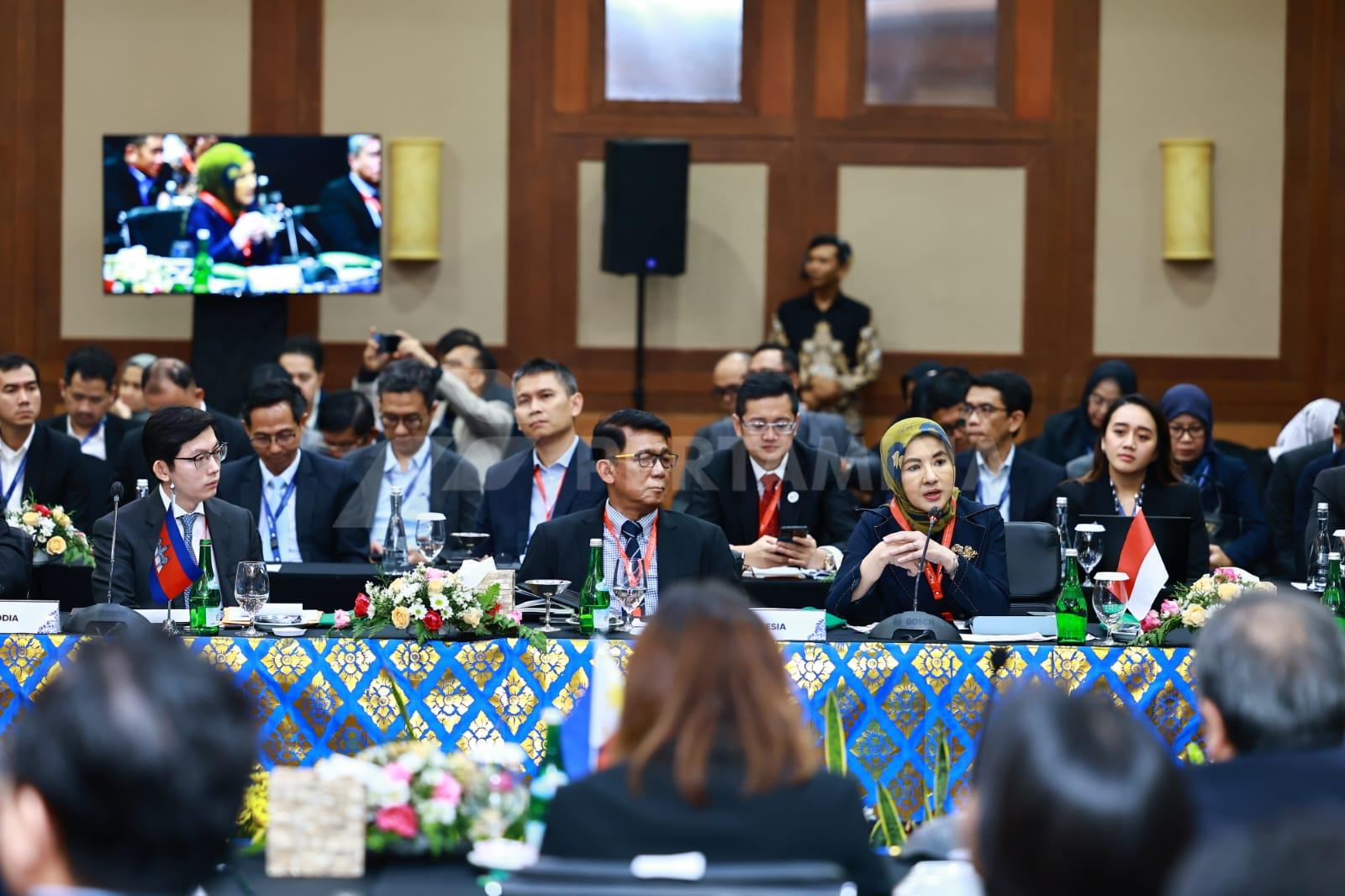 President Director of Pertamina, Nicke Widyawati, presenting two Outcome-Based Strategies to support the implementation of the ASEAN Plan of Action for Energy Cooperation (APAEC) Post-2025 Development at the ASCOPE 8th Mid-Year Meeting 2024 Leadership Forum session.
President Director of Pertamina, Nicke Widyawati, presenting two Outcome-Based Strategies to support the implementation of the ASEAN Plan of Action for Energy Cooperation (APAEC) Post-2025 Development at the ASCOPE 8th Mid-Year Meeting 2024 Leadership Forum session.
President Director of Pertamina Presents Two Strategies to Achieve ASEAN Economic Community
Bali, May 28, 2024 – Indonesia, through Pertamina, reaffirmed its support for achieving the ASEAN Economic Community (AEC) 2045 by implementing the ASEAN Plan of Action for Energy Cooperation (APAEC) Post-2025 Development, a blueprint for regional energy cooperation in ASEAN. It was conveyed by the President Director of Pertamina, Nicke Widyawati, at the ASEAN Council on Petroleum (ASCOPE) Mid-Year Task Force Meeting 2024 in Bali from May 27-30, 2024.
Nicke, as the ASCOPE Council Member for Indonesia, stated that the strategic direction of APAEC can align with the ASEAN Community Vision 2045. It aims to maximize policy-making that supports the ASEAN multilateral energy cooperation implementation. From Pertamina's perspective, Nicke proposed two impact-based strategies.
“Pertamina suggests expanding program areas that cover oil and gas security, affordability, and sustainability. To achieve these goals, Pertamina presents two Outcome-Based Strategies,” said Nicke during the ASCOPE Leadership Forum session.
The two Outcome-Based Strategies proposed by Pertamina are, first, advancing the Trans-ASEAN Gas Pipeline (TAGP) connectivity. Indonesia, through Pertamina, suggests enhancing the accessibility and connectivity of gas/LNG through physical and virtual pipeline networks and regasification terminals.
“The Trans-ASEAN Gas Pipeline program must be implemented sustainably. The ASCOPE Gas Advocacy Task Force has made progressive efforts, extending the MoU between countries until 2034 and including more infrastructure, such as virtual pipeline infrastructure, to improve connectivity and accessibility within the ASEAN region,” Nicke explained.
Furthermore, Nicke elaborated that Pertamina’s second strategy is to enhance Energy Security, Affordability, and Sustainability through four action plans encompassing upstream to downstream perspectives. These include mapping regional oil and gas resources and balancing supply-demand systems outside pipelines to support regional energy security and economic growth; developing the upstream sector by applying low-carbon technologies (such as decarbonization, methane reduction, CCS/CCUS, low-carbon LNG); increasing the use of diversified energy sources by leveraging gas derivatives (such as methanol, hydrogen, and ammonia) to support low-carbon solutions; and crucially, establishing the ASEAN Center of Excellence for Oil, Gas, and Bioenergy to enhance capacity and skills in advancing low-carbon technology to support Net Zero Emissions targets.
In conclusion, Nicke emphasized the importance of aligning energy strategies through collaboration to achieve optimal benefits for each company and country.
"Through collective action and innovative solutions, we can strengthen our energy infrastructure and resilience, ensuring a secure and sustainable energy future in the ASEAN region. Let us move forward together, committed to achieving shared goals for the benefit of all member countries," Nicke concluded.
In addition to Pertamina, other ASCOPE member countries also presented their business plans and developments to support the APAEC goals. Some participating countries also explored potential bilateral cooperation to optimize regional energy business development.
ASCOPE Secretary In Charge (ASIC), Dr. Tran Hong Nam from Vietnam, appreciated the forum discussion, noting that collaborative initiatives and knowledge exchange are strategically crucial to addressing various challenges faced by the energy sector in ASEAN.
"I hope this leadership forum participants can share new perspectives on APAEC development, where ASEAN national oil companies share relevance and understand the landscape of our future energy sector," Dr. Tran stated.
Pertamina, as a leading company in the energy transition, is committed to supporting the Net Zero Emission 2060 target by continuously promoting programs that directly impact the Sustainable Development Goals (SDGs) achievement. All these efforts align with Environmental, Social, and Governance (ESG) implementation across all Pertamina's business lines and operations.**